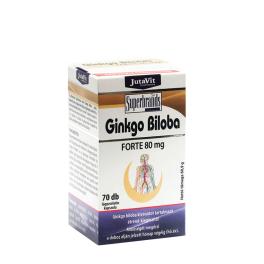The leaves of the ginkgo biloba tree are used for medicinal purposes. The tree itself is an incredibly interesting plant, one of the oldest species of trees, native to China, Japan and Korea, with some members living up to 1000 years. Its leaves have been used by the Chinese medicinal community for thousands of years and are one of the most widely used medicinal plants.
The main active constituents of ginkgo leaf are terpenoids, ginkgo is characterised by its unique structure of terpene lactones.
In France and Germany, it is prescribed by doctors by prescription for the treatment of dementia and mild cognitive (mental) impairment and limping. In the rest of Europe it is available without prescription as a food supplement.
The active ingredients in ginkgo biloba stimulate blood flow and have anticoagulant effects, increasing the amount of blood to the brain. If your brain gets more blood, it will also get more of the nutrients it needs to function, resulting in better brain function overall. In addition, recent studies have shown that it also directly stimulates neurotransmitters, the substances that connect nerve cells.
Ginkgo biloba extract is widely used to treat and prevent a variety of neurodegenerative diseases - including Alzheimer's, Parkinson's, tinnitus, dementia, stroke.
Interestingly, ginkgo biloba extract may also have mood-enhancing effects, which may improve the mood of individuals suffering from depression. Studies suggest that it does this by inhibiting a protein-producing protein. This protein (called S100-B protein), produced in brain injury and by various inflammatory processes, is thought to stimulate the 'repair' of damaged nerve cells, but higher levels have been linked to depression.
Because of its effects on blood circulation, it is also of particular benefit in cardiovascular disease. This is reinforced by the antioxidant and blood sugar regulating effects of ginkgo. As most cardiovascular diseases are caused by a breakdown in blood sugar balance and increased inflammation by free radicals. Together these can lead to atherosclerosis and various cardiac arrhythmias and hypertension, as well as diabetes.
Ginkgo biloba:
- Reduces the release of plaques that lead to atherosclerosis due to its anticoagulant effect.
- Reduces blood pressure by increasing blood coagulation.
- By stabilizing blood sugar levels, it may improve the treatment of diabetes.
It can therefore be of real benefit to people suffering from cardiovascular diseases.
So ginkgo biloba is a medicinal plant that has been used for centuries and is widely researched. Its effects have been proven by studies, it can bring improvements in a wide range of different neurological and cardiovascular diseases.



















